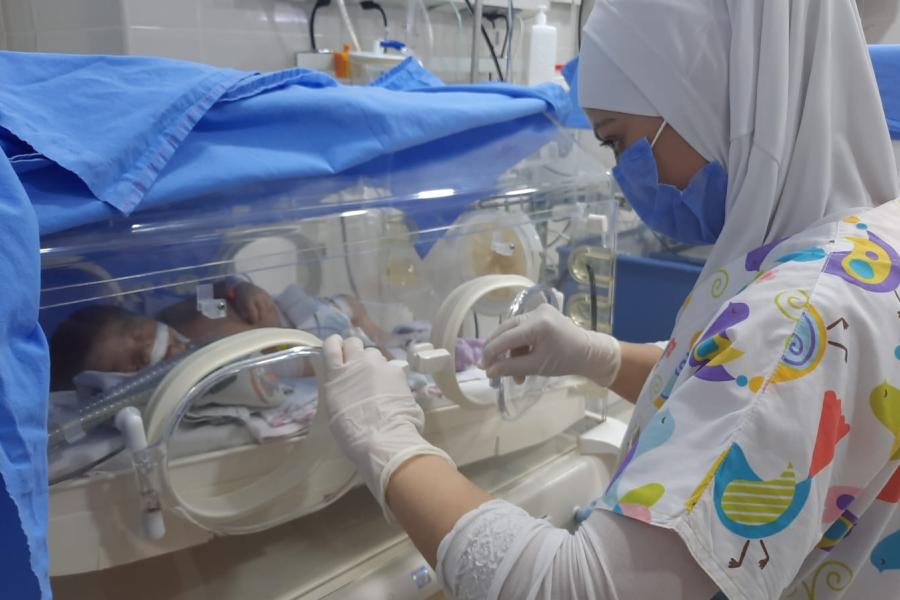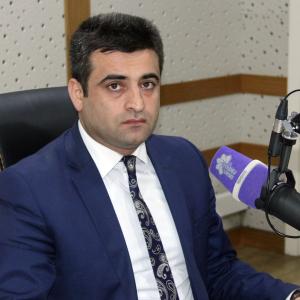UNHCR continues promoting refugee education in Azerbaijan with the support of the United States and other donors
21 September 2022
- UNHCR’s efforts in the field of education are already yielding some tangible results as several young refugees have started to find decent jobs in public and private entities in Azerbaijan.

UNHCR is thankful to the donors, particularly to the United States of America and the Federal Republic of Germany, as their financial contributions enabled UNHCR to continue promoting refugee education and inclusion.
Apart from ensuring free and unhindered access to primary and secondary education, UNHCR Azerbaijan provides material assistance to all refugee and asylum seeker families once a year to cover the expenses of purchasing school supplies and uniforms. As the new academic year is about to start, UNHCR Azerbaijan distributes one-time allowances for each refugee and asylum seeker child attending school. Last year, UNHCR distributed more than 350 tablets to refugee and asylum seeker schoolchildren to facilitate their access to online classes during the Covid-19 pandemic.
In 2021, within the DAFI Scholarship (Albert Einstein German Academic Refugee Initiative funded by the German Federal Government) Programme, UNHCR Azerbaijan supported 23 refugee students with tuition fees and monthly allowances. Additionally, UNHCR covered tuition fees for some 47 young refugees and asylum-seekers studying in universities and colleges with the funds allocated by other donors, primarily by the United States. Furthermore, some private universities, such as ADA and Khazar University, provided full or partial scholarships to refugee and asylum seeker students.
In 2022, additional 5 refugee students were enrolled in the DAFI Scholarship Program, while in parallel UNHCR committed to supporting more than 40 refugee students by transferring their annual fees to their higher education institutions.
Last week, the UN Refugee Agency published its annual education report as world leaders were preparing to debate the future of learning at the Transforming Education Summit at the UN General Assembly in two days. By publishing that report, UNHCR is calling for the inclusion of refugees in national education systems from the start of humanitarian emergencies, through protracted displacement situations, and in longer-term development planning. Also writing in the report, Filippo Grandi, United Nations High Commissioner for Refugees, noted that many countries had recently made great progress towards including refugee learners in formal national education systems.
The UNHCR Country Representative in Azerbaijan Guido Ambroso commended the cooperation with the Government that enabled UNHCR to ensure free access and unimpeded access to primary and secondary education for all refugee and asylum seeker children in Azerbaijan and the donor support. “We highly appreciate the openness of the Azerbaijani Government to grant refugee children access to its educational system and are very grateful for the continuous financial assistance by the United States and Germany which allows us to support young and talented refugees to study in colleges and universities in Azerbaijan. In cooperation with the State Migration Service, which I would like to thank, we have managed to get employment for some of the refugees after their successful graduation.” said the Representative.
Nilab Zeynaddin, a young refugee from Afghanistan, has recently been employed as a nurse by the Leyla Medical Centre after her successful graduation from Baku Medical College. Nilab was supported by UNHCR Azerbaijan throughout her studies as the Agency paid her annual tuition fees and some expenses related to transport and purchasing supplies. When Nilab received a job offer from the Leyla Medical Centre, the State Migration Service immediately issued a PIN code which was essential to document her labour contract.
UNHCR Azerbaijan, in cooperation with the relevant national authorities, continues to take measures to promote and facilitate refugee education at all levels. The goal is to improve self-reliance opportunities for the refugees in Azerbaijan and ensure their full and efficient inclusion in the social, economic, and cultural life of the society. As said by the UN High Commissioner for Refugees Filippo Grandi, education is an investment in development, human rights and peace. In this regard, support from the donors is crucial and commendable as it is an investment in the people who will successfully integrate into the host societies or rebuild their countries when they can safely return home.



